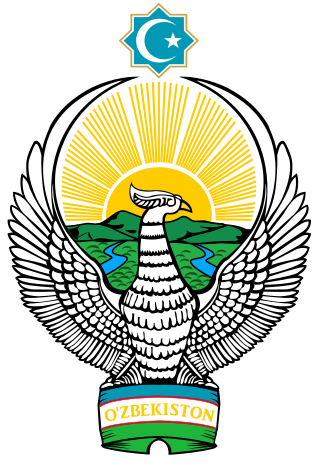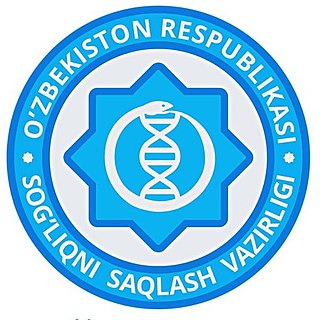
The Republic of Uzbekistan is a semi-presidential constitutional republic, whereby the President of Uzbekistan is head of state. Executive power is exercised by the government and by the Prime Minister of Uzbekistan.

The Oliy Majlis is the parliament of Uzbekistan. It succeeded the Supreme Council of the Republic of Uzbekistan in 1995, and was unicameral until a reform implemented in January 2005 created a second chamber.

The Legislative Chamber is the lower chamber of the Oliy Majlis of the Republic of Uzbekistan. It has 150 members, elected for a five-year term.

The Senate is the upper house of the Oliy Majlis of the Republic of Uzbekistan.

The president of the Republic of Uzbekistan is the head of state and executive authority in Uzbekistan. The office of President was established in 1991, replacing the position of Chairperson of the Presidium of the Supreme Soviet of the Uzbek SSR, which had existed since 1925. The president is directly elected for a term of seven years, by citizens of Uzbekistan who have reached 18 years of age.

The Constitution of Uzbekistan was adopted on 8 December 1992 on the 11th session of the Supreme Council of Uzbekistan. It replaced the Constitution of the Republic of Uzbekistan of 1978. It is the supreme law of the Republic of Uzbekistan. The Constitution of Uzbekistan contains six parts and it is further divided into 26 chapters.

Kegeyli district is a district of Karakalpakstan in Uzbekistan. The capital lies at the town Kegeyli. Its area is 920 km2 (360 sq mi) and it had 73,600 inhabitants in 2022.

The Ecological Party of Uzbekistan is a political party and environmental movement in Uzbekistan. It was founded on 2 August 2008 as the Ecological Movement of Uzbekistan, and re-inaugurated as a formal political party in January 2019 in advance of expected electoral reforms.

Charjou Abdirov was a noted Uzbek (Karakalpak) microbiologist and specialist in leprosy as well as a researcher into the environmental problems of the Aral region. He was the first rector of the Nukus State University, academician, Vice-President of the Uzbek Academy of Sciences, and politician.

The Ministry of Public Health of the Republic of Uzbekistan,, is an agency of the government of Uzbekistan, headquartered in Tashkent. The Ministry of Health of the Republic of Uzbekistan is the central governmental management organ of management in healthcare and in its activities is subordinated to the Cabinet of Ministers of Uzbekistan.
Abdusalom Abdumavlonovich Azizov is an Uzbek military leader who was the Minister of Defence of Uzbekistan from 4 September 2017 to 11 February 2019. He now serves as head of the State Security Service.

The National Guard of the Republic of Uzbekistan is a uniformed independent formation within the Armed Forces of the Republic of Uzbekistan. The headquarters of the National Guard is based in Tashkent, where most of the 30,000 soldiers that make up the force are located. As of 2020, the individual in charge of the UNG is currently Rustam Jo'raev. He succeeded Colonel General Bakhodir Tashmatov and Botir Tursunov.

Kuksaroy Presidential Palace, meaning the Blue Palace in English, is currently the official workplace of the President of Uzbekistan. It is located in the northeastern Mirzo Ulugbek District of Tashkent.
The Constitutional Court of the Republic of Uzbekistan is the supreme constitutional court of Uzbekistan. Its tasks include reviewing whether proposed laws conflict with the Constitution of Uzbekistan, and whether laws of the Republic of Karakalpakstan conflict with the laws of the Republic of Uzbekistan. Under Article 95 of the Constitution, it is also tasked with authority to approve the President of Uzbekistan's decision to dissolve the Oliy Majlis. The court's decisions are final and unappealable.
The National Security Council under the President of Uzbekistan is the central advisory body of the Uzbek government which aides and assists the President in implementation of military policy.
Musa Tajetdinovich Yerniyazov was a Soviet and Uzbek state and political figure. He was Chairman of the Parliament of Karakalpakstan, as well as member and Deputy Chairman of the Senate of Uzbekistan.
Qobul Beknazarovich Tursunov is an Uzbek economist and statesman. Governor of Nurota District and chairman of budget and the chairman of the Committee on Budget and Economic Reforms of the Senate of the Oliy Majlis. From December 25, 2016 to 2021, he worked as the governor of Navoi region. In 2015, he was elected to the Senate of the Oliy Majlis of the Republic of Uzbekistan of the III convocation.
Shavkat Abdullayevich Ayupov is a Soviet Uzbek scientist in the field of mathematics. He is an Academician of the Uzbekistan Academy of Sciences (1995). He is also a Senator in the Senate of the Oliy Majlis of the Republic of Uzbekistan (2020). He was awarded the title of Hero of Uzbekistan in 2021, and he holds the title of Distinguished Scientist of the Republic of Uzbekistan (2011).
Ravshanbek Davletovich Qurbonov is an Uzbek physician, state and political figure, deputy of the Oliy Majlis of the I and II convocations, senator of the Oliy Majlis of the Republic of Uzbekistan of the IV convocation. In 2017, he became an academician of the Academy of Sciences of Uzbekistan. In 2016, he was awarded the title of Hero of Uzbekistan.

Azamat Ziyo is a state and public figure, academician. He was the former press secretary of the first president of Uzbekistan, Islam Karimov. He is a member of the "National Revival" party. He is the chief editor of the “Oʻzbekiston tarixi” journal. He was born on June 23, 1963, in Tashkent, in the family of a famous Uzbek historian and scholar Hamid Ziyoyev (1923—2015).












